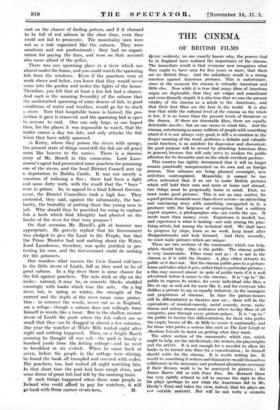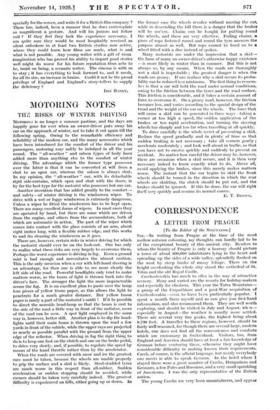THE CINEMA
OF BRITISH FILMS
QurrE suddenly, no one exactly knows why, the powers that be in F.ngland have realized the importance of the cinema. The immediate result is that everyone now recognizes what they ought to have seen for five years or more, that there are no British films. And the subsidiary result is a strong reaction against American pictures. This is unfortunate, since at the moment the cinema is virtually American and little else. Now while it is true that many films of American origin are deplorable, that they are vulgar and sensational and even dismally stupid; it is also true that we owe the present vitality of the cinema as a whole to the Americans, and that their best films are the best in the world. It is also true that while the cultural level of the cinema on the whole is low, it is no lower than the present levels of literature or the drama. If there are detestable films, there are equally detestable novels ; but no one seems to mind this. And the cinema, entertaining so many millions of people with something which if it is not always very good, is still a re-creation in the deeper meaning of the word, performs a definite and valuable social function, is an antidote for depression and discontent. No good purpose will be served by attacking American films in general, because this will only serve to wealien the public affection for its favourite and on the whole excellent pastime.
This country has rightly determined that it will no longer remain practically unrepresented on its own and on foreign screens. New schemes are being planned overnight, new activities contemplated. Meanwhile, it cannot be too often reiterated that if we are to make British pictures which will hold their own and more at home and abroad, two things must be perpetually borne in mind. First, we must make good pictures. This is not an easy matter, for a good picture demands more than clever actors—an interesting and Convincing story with Something unexpected in it, a producer with the largeness of conception that a Military expert requires, a photographer who Can excite the eye. It needs more than money, even. Experience is needed, too, and experience is what is lacking—not only among the prac- tising artists, but among the technical staff. We shall have to progress by steps, learn as we work, keep heart after disappointments and look forward. - And then, secondly, we must make pictures which are unique.
There are two sections of the community which can help, which should help. One is the public. The cinema public is very inarticulate. Films come and go ; it is not in the cinema as it is with the theatre. A play either attracts its public or it does not. But the cinema public goes to a picture. house and takes what it gets, rather than to particular pictures; a film may succeed almost in spite of public taste if it is well advertised before it comes to the cinemas. It is "up to" the public to express its wishes, for every individual who likes a film to say so and ask for more like it, and for everyone who dislikes a picture to say so equally definitely, to the managers and proprietors of cinemas. In time the picture-houses will be differentiated as theatres now arc ; there will be the equivalents of musical-comedy, social comedy, revue, melo- drama and serious drama audiences where to-day films of all categories pass through every picture-palace. It is "up to " the public to hasten this differentiation, for those- who prefer the empty luxury of Mr. de Mille to secure it continually, and for those who prefer a serious film such as The Last Laugh or Abraham Lincoln to insist on getting what they want.
The other section of the community which can, which ought to help, are the intellectuals, the writers, the playwrights and the artists. It is not enough for a novelist to allow his books to -be turned into films for a consideration ; he himself should write for the cinema. It is worth writing for. It would be something if writers and dramatists would themselves collaborate in the necessary and profound alterations necessary if their literary work is to be conveyed in pictures ; Sir James - Barrie did so with Peter Pan. Mr. Bernard Shaw has very rightly refused to sell to anyone the right to film his plays (perhaps he saw what the Americans did to Mr. HardY's Tess) and takes the view, indeed, that his plays are nnt suitable material. But will he not write a scenario
specially for the screen, and write it for a British film company ? There has, indeed, been a rumour that he does contemplate so magnificent a gesture. And will his juniors not follow suit ? If they feel they lack the experience necessary, I am quite sure they would be most hospitably received as silent onlookers in at least two British studios now active, where they could learn how films are made, what is and what is not possible. Any young writer with a gift of visua imagination who has proved his ability to impart good stories well might do worse for his future reputation than ache to .be, insist on being, a scenario writer. The cinema is with us to stay; it has everything to look forward to, and it needs, for all its 4ize, an increase in brains. Could it not be the proud privilege of England and England's story-tellers to supply the deficiency ?
Bus BARRY.



























































 Previous page
Previous page